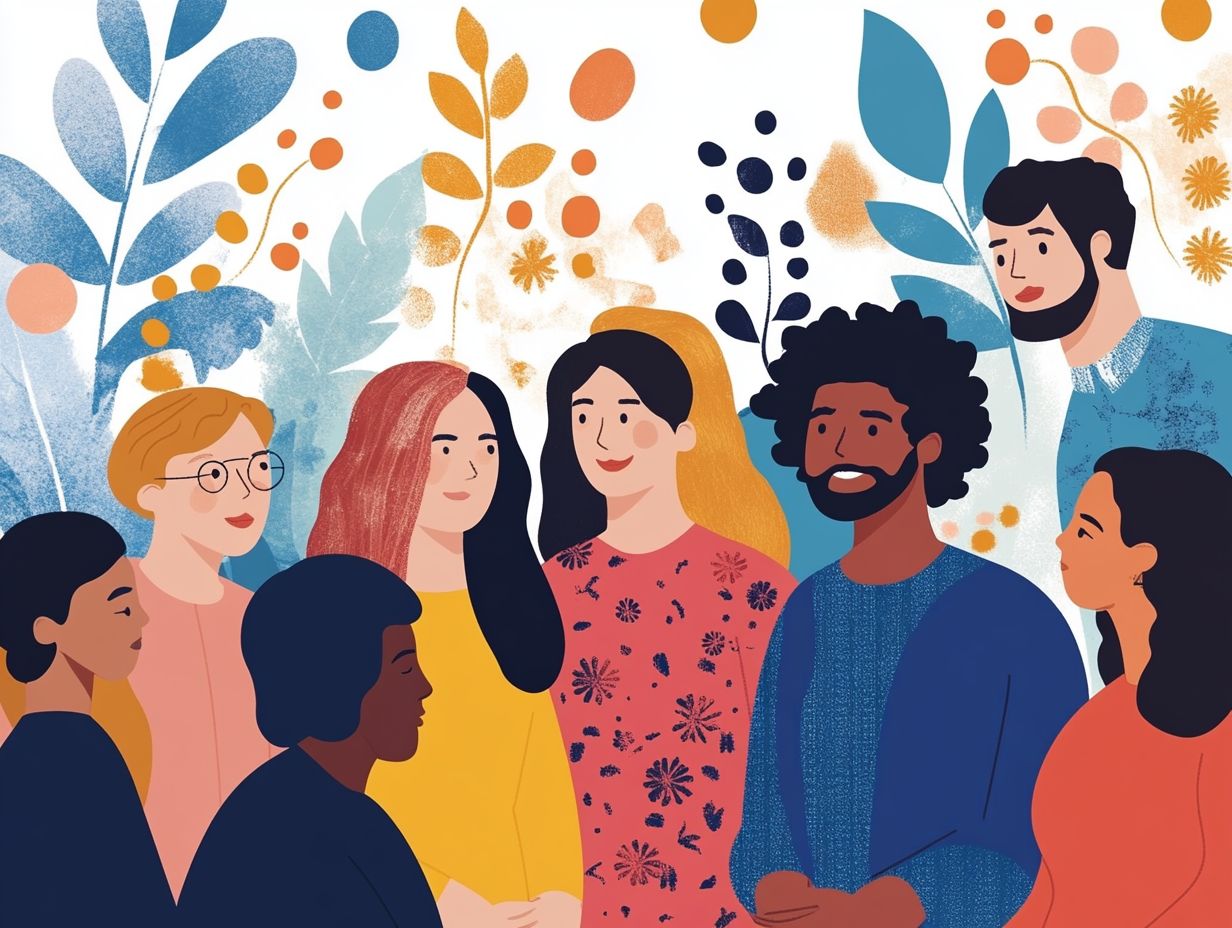Cultural Adjustment and Its Impact on Mental Health
Cultural adjustment is a journey you embark on when transitioning to a new environment, whether due to relocation, study, or travel. This process can be intricate, shaped by your unique traits as well as broader societal dynamics.
As you delve into the various factors influencing cultural adjustment, it s crucial to recognize the significant impact this experience can have on your mental health. This article discusses common challenges and practical tips to support yourself and others during this transformative phase.
Explore the nuances of cultural adjustment with us and uncover valuable resources that can assist you on this important journey.
Contents
- Key Takeaways:
- What You Need to Know About Cultural Adjustment
- Factors Affecting Cultural Adjustment
- The Impact of Cultural Adjustment on Mental Health
- Supporting Others Through Cultural Adjustment
- Resources for Cultural Adjustment and Mental Health
- Common Questions About Cultural Adjustment
- What is cultural adjustment and how does it impact mental health?
- What are some common mental health challenges faced during the process of cultural adjustment?
- How can cultural adjustment affect an individual’s relationships?
- What are some ways to cope with the impact of cultural adjustment on mental health?
- Can cultural adjustment have a positive impact on mental health?
- What are some resources available for individuals struggling with cultural adjustment and its impact on mental health?
Key Takeaways:

- Cultural adjustment involves adapting to a new culture and can be influenced by individual and societal factors.
- The impact of cultural adjustment on mental health can lead to challenges such as feelings of isolation and anxiety.
- Seeking help from professionals and friends can ease your adjustment.
What You Need to Know About Cultural Adjustment
Understanding cultural adjustment is crucial for your success as an international student, especially if you’re coming from Eastern Europe to study at a Lithuanian university. This journey isn t just about academics; it involves adjusting to social and cultural differences.
You will likely face a variety of challenges along the way, such as language barriers and the need for social support systems. Maintaining your psychological well-being is essential during this transition, as these factors can profoundly affect your mental health and overall experience in higher education.
Definition and Process
Cultural adjustment is the process you undergo as you adapt to a new cultural environment. This involves developing essential skills for successful integration.
Your journey typically unfolds in stages, beginning with an initial wave of excitement known as the honeymoon phase. However, as the novelty wears off, you may encounter culture shock, characterized by frustration and confusion as you navigate unfamiliar customs and social norms.
To effectively navigate these stages, honing your language skills and understanding the host culture is crucial. This enables you to build meaningful connections and integrate more seamlessly.
Cultural adjustment requires resilience, openness, and the willingness to step outside your comfort zone to achieve a cohesive understanding and appreciation of your new environment.
Factors Affecting Cultural Adjustment
Your experience as an international student is shaped by various factors. Individual characteristics, societal influences, and demographic elements all play pivotal roles, creating a rich tapestry of challenges and opportunities.
Individual and Societal Factors

Individual factors such as your personality traits and previous experiences, along with societal elements like supportive social networks, can significantly influence your cultural adjustment.
Your ability to navigate unfamiliar environments is vital. If you have an open and adaptable personality, you may find it easier to embrace new cultures. Conversely, if you are more introverted, you might face initial challenges.
Peer groups and mentorship opportunities can buffer against feelings of isolation, fostering a sense of belonging. Additionally, community acceptance and the availability of resources can enhance or impede your adjustment process, ultimately determining how well you acclimate to your academic and social experiences abroad.
The Impact of Cultural Adjustment on Mental Health
Cultural adjustment is crucial in shaping the mental health of international students. When adaptation is inadequate, it can lead to a range of physical symptoms related to stress, as well as feelings of depression and anxiety.
These issues can significantly impact their overall psychological well-being, making it essential to prioritize a smoother transition into their new environment.
Common Mental Health Challenges
International students often encounter a range of mental health challenges, including symptoms of depression and anxiety, as well as various health complaints, especially when faced with culture shock and a risk of social isolation.
As you adapt to a new environment, feelings of loneliness may set in, leaving you disconnected from your support networks back home a situation that can deepen your sense of helplessness.
Cultural differences in communication styles, lifestyle habits, and academic expectations can add to your stress, making the journey feel overwhelming. You might find yourself grappling with the pressure to excel academically while simultaneously navigating these complex cultural landscapes.
This emotional strain can lead to unhealthy ways of coping, such as withdrawing from social activities or neglecting self-care routines. It s crucial to recognize these challenges, as fostering resilience and promoting mental well-being can significantly enhance your overall educational experience.
Coping Strategies
Implementing effective coping strategies is crucial for you as an international student navigating adjustment challenges. Social and emotional support play vital roles in fostering resilience and enhancing your language skills.
Consider forming connections with peers who share similar backgrounds, engaging in campus organizations, or participating in cultural exchange programs that promote inclusivity. Seeking mentorship from local students or faculty can deepen your understanding of the cultural nuances that shape social interactions.
Practicing mindfulness or joining support groups can be excellent ways for you to manage stress while encouraging open conversations about your experiences. Using campus counseling services can give you the support you need to bolster your mental well-being, allowing you to thrive both academically and socially in your new environment.
Supporting Others Through Cultural Adjustment

Supporting others during their cultural adjustment is essential for cultivating an inclusive environment. By doing so, you enhance emotional support and strengthen social networks, both of which are vital for a successful adaptation.
Tips for Helping Friends and Family
When you’re helping friends and family navigate cultural adjustment, focus on practical tips like offering emotional support, engaging in social networks, and encouraging effective coping strategies.
This transition can be quite challenging, so being an empathetic listener is essential. By recognizing their feelings and validating their experiences, you create a safe space for open discussion.
It can be incredibly beneficial to introduce them to community groups or cultural organizations where they can connect with others who share similar experiences, fostering a genuine sense of belonging.
Providing them with resources like language classes or local events can significantly ease the adjustment process. Reminding them of their strengths and promoting open communication will not only build their resilience but also strengthen your bond, making them feel valued and understood throughout their journey.
Resources for Cultural Adjustment and Mental Health
Accessing the right resources for cultural adjustment and mental health is essential for enhancing your well-being as an international student. It not only provides you with professional help but also connects you with support groups and student support programs that can make your experience smoother and more fulfilling.
Don t hesitate to access these resources for a smoother adjustment! Take the first step towards better mental health today!
Professional Help and Support Groups
Seeking professional help and joining support groups can provide you with invaluable assistance as you navigate the challenges of adjusting to a new culture. These resources are essential for ensuring a thorough health evaluation and tailored support.
These resources help address emotional and psychological challenges related to moving to a new country. Mental health professionals can equip you with helpful tips to manage feelings of isolation and anxiety, while support groups create a sense of community and understanding among peers who share similar experiences.
By engaging with these networks, you can uncover coping mechanisms and cultural insights that will enhance your integration. Discovering helpful tips can make all the difference. Embrace your new surroundings and feel at home! This collaborative environment gives you the power to strengthen your sense of belonging, which is vital for your overall well-being.
Common Questions About Cultural Adjustment

What is cultural adjustment and how does it impact mental health?
Cultural adjustment is how you adapt to a new culture and its way of life. It can have a significant impact on a person’s mental health, as it involves coping with unfamiliar surroundings, language barriers, and social isolation. Understanding the impact of cultural adjustment on academic success is crucial for navigating this transition effectively.
What are some common mental health challenges faced during the process of cultural adjustment?
Some common mental health challenges that individuals may experience during cultural adjustment include anxiety, depression, feelings of loneliness and isolation, and difficulty managing stress and emotions. Understanding these issues is crucial, as explored in the science behind cultural adjustment and resilience.
How can cultural adjustment affect an individual’s relationships?
Cultural adjustment can strain relationships, both with people from the new culture and with loved ones back home. It can lead to miscommunication, misunderstandings, and feelings of disconnection, causing strain on interpersonal relationships.
What are some ways to cope with the impact of cultural adjustment on mental health?
Some helpful coping strategies include finding support through community groups or organizations, maintaining a healthy routine, practicing self-care, and seeking therapy or counseling if needed.
Can cultural adjustment have a positive impact on mental health?
Yes, cultural adjustment can also have a positive impact on mental health. It can lead to personal growth, increased empathy and understanding, and a broader perspective on the world. It can also provide a sense of accomplishment and resilience as individuals navigate through challenges.
What are some resources available for individuals struggling with cultural adjustment and its impact on mental health?
There are many resources available, such as support groups, counseling services, and online communities. It can also be helpful to connect with others who have gone through a similar cultural adjustment, as they can provide valuable insight and support. It is important to seek out resources and support to help manage the impact of cultural adjustment on mental health.






